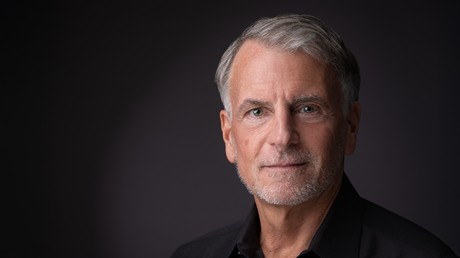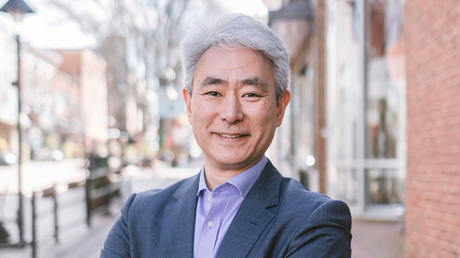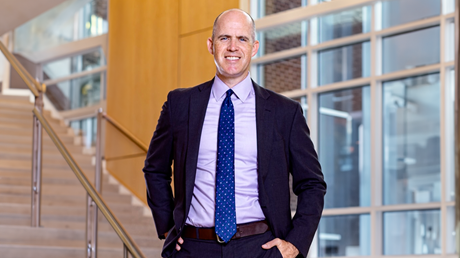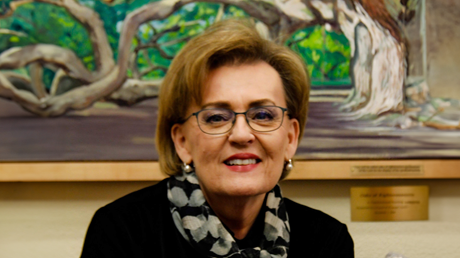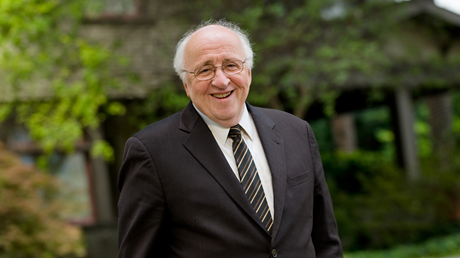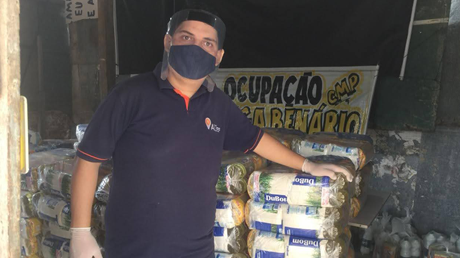Will you help encourage and connect the church?
Give NowWill you help encourage and connect the church?
Give NowMatt Woodley, Editor of PreachingToday.com, is known around Christianity Today as the "Illustration Guy," for his love of finding stories to help preachers illustrate biblical texts in a clear and applicable way. But his love for preaching extends even beyond the walls of Christianity Today, and his own church, Church of the Resurrection. At "Rez," as the locals call it, Matt serves as the Missions Pastor. This gives him the great honor of travelling the globe and visiting pastors in other countries, taking not only Church of the Resurrection with him but also Preaching Today. Andrew Finch, Administrative Editor for Preaching Today, sat down with Matt Woodley to talk about his travels, his role in his travels, and the health of the church world-wide.
Why were you recently in Nigeria, Cambodia, and Singapore?
In December 2014 I spent two weeks in Jos, Nigeria, a city of about 1.3 million three hours northeast of Nigeria's capital city, Abuja. Then in May 2015 I spent two weeks in Phnom Penh, Cambodia and Singapore. Both trips were part of our church's (Church of the Resurrection in Wheaton, Illinois) initiative to build long-term partnerships with churches in the Majority World.
What was your role when you were there?
They kept me hopping in Nigeria with almost daily speaking engagements, training church leaders, or speaking at churches and local Christian high schools. I remember my host, the Rev. Mark Mukan, calling my hotel room at 11:30 p.m. and calmly telling me that tomorrow morning I was scheduled to speak at 7:00 a.m. for 45 minutes to 600 high school students and another 30 minutes to the 50 teachers at the school. When I complained that I had nothing prepared and it was less than eight hours away and I needed some sleep, he dismissed my complaints by saying, "Oh, that's okay, you will be a blessing." That's the way it rolls in Nigeria. I grew to love it.
In Cambodia my role was to spend time with Pastor Gregory Whitaker and his family—a family our church sent out to pastor a local international congregation in Phnom Penh. I also spent lots of time getting to know the land and history of Cambodia, visiting a local Killing Fields museum, meeting with pastors from small villages, and getting to know other church leaders. In Singapore I had the opportunity to preach on Sunday morning and to lead two half-day preaching workshops.
How is the church growing in these countries?
In Nigeria and Singapore the church is thriving, although Jos, Nigeria has seen a lot of violence and suicide bombs perpetrated by the terrorist group, Boko Haram. The Diocese of Jos for the Anglican Church is equipping a new wave of pastors, church planters, and evangelists who will return to the northeast corner of Nigeria to restart the churches that have been destroyed by terrorists.
The Church in Cambodia is struggling to get restarted. From 1975-1979 the Communist dictator Pol Pot and his Khmer Rouge forces starved or murdered nearly a fourth of the population. Some people estimate that he also wiped out up to 80-90 percent of the Christians in the country. The country and the church have not recovered. But as Paul says in the Book of Acts, God has not left himself without a witness. I sensed a real openness among the people—that they are struggling to find something in the spiritual realm to bring meaning and healing. The country is primarily Buddhist, but seems to be a thin veneer. It seems like many of the young people are truly seeking to love and be loved, and I can't think of a better story, a better foundation, than the story of our Triune God who came to love and redeem us and bring us from shame to glory.
How did the pastors/leaders respond to the new "The Complete Preacher's Skills Guide" from Preaching Today, which you used in the workshops you led?
So I led one workshop for about 65 preachers and another workshop for about 35 lay leaders and lay preachers, and The Complete Preacher's Skills Guide was very well received. The nine step process (including preparing your own soul, planning your preaching, getting the big idea from the text, outlining your idea, and so forth) is a helpful framework to help preachers think through what's involved in preaching week in and week out. The workshop was very interactive, so as we walked through most of those stages we were working with a specific passage in a group setting, finding the big idea, making a simple outline, thinking of illustrations and applications, and so forth.
What is something you learned from pastors in these countries?
Here's the biggest lesson: that Christianity, that spreading the gospel, often requires suffering, vulnerability, and possibly even death. That's not a common theme in Western Christianity. But in Jos and Phnom Penh Christians expect to suffer. At times they are even ready to die for their faith. Of course they're human, too. They get scared, angry, and exhausted. They aren't super-saints, but when you know how to suffer, when you don't try to avoid suffering, there is a freedom and a depth in your Christian life that we often lack in the West.
Is there anything you would like to add? Any interesting stories?
Oh, yes, I ate Durian for the first time. My friends from Singapore told me it's called "the king of the fruits," but that you either love it or hate it. It looks like a pineapple that's wrapped with a dead porcupine—pretty nasty, in other words. You cut it open and extract the fruit, which looks like kind of hard, hairy, yellowish-orange custard. There is no way I can describe what it tasted like, but when asked how I liked it I said, "Wow, it's not bad." Now in my home state of Minnesota, "not bad" means "pretty good." Durian is an acquired taste, I think. After the incident I discovered that our piece of fruit probably cost about $100. I had no idea it was such a delicacy.


